
-
 Trump starts key Asian tour with deals ahead of China meet
Trump starts key Asian tour with deals ahead of China meet
-
Hurricane Melissa strengthens as it crawls toward Jamaica
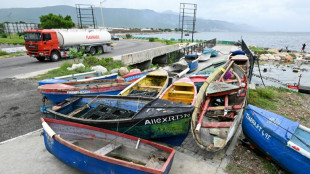
-
 India and China to resume direct flights as ties improve
India and China to resume direct flights as ties improve
-
Bencic overpowers Noskova in Tokyo for 10th WTA title

-
 Red-carpet welcome for Trump in Malaysia as key Asian tour gets underway
Red-carpet welcome for Trump in Malaysia as key Asian tour gets underway
-
Yamamoto dazzles as Dodgers beat Blue Jays 5-1 to level World Series

-
 NBA champion Thunder off to 3-0 start as Sixers beat Hornets
NBA champion Thunder off to 3-0 start as Sixers beat Hornets
-
East Timor joins ASEAN after 14-year campaign

-
 Trump kicks off Asia tour with Malaysia summit ahead of Xi meeting
Trump kicks off Asia tour with Malaysia summit ahead of Xi meeting
-
Venezuela vows to protect its coast from US covert ops

-
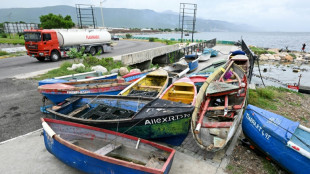 Hurricane Melissa cutting deadly path in Caribbean
Hurricane Melissa cutting deadly path in Caribbean
-
Predators 'slip through the cracks' in Australian childcare
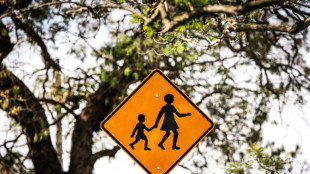
-
 Prison film fest brings Hollywood and healing to US jailhouse
Prison film fest brings Hollywood and healing to US jailhouse
-
US Fed will likely cut again despite economic murkiness from shutdown

-
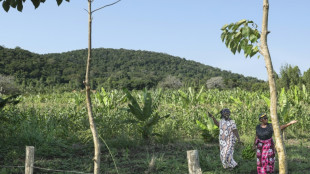 Global race for rare earths comes to Kenya's Mrima Hill
Global race for rare earths comes to Kenya's Mrima Hill
-
LA shoemaker holds Hollywood's past in a dying art

-
 Trump not 'wasting time' with Putin as Kremlin envoy visits US
Trump not 'wasting time' with Putin as Kremlin envoy visits US
-
Verstappen says he needs others to retire to keep F1 hopes alive

-
 Pallister's 800m free leads world record rush at Toronto World Cup
Pallister's 800m free leads world record rush at Toronto World Cup
-
Hamilton optimistic of ending unwanted run with a first podium finish

-
 Beaming Norris turbo-charges his F1 title bid with Mexico pole
Beaming Norris turbo-charges his F1 title bid with Mexico pole
-
McLaren's Norris takes stunning pole in Mexico ahead of both Ferraris

-
 Jalibert worried he might miss France games after Top 14 injury
Jalibert worried he might miss France games after Top 14 injury
-
Liverpool 'quality' will overcome slump, says Van Dijk

-
 Kamala Harris says may 'possibly' run again for White House
Kamala Harris says may 'possibly' run again for White House
-
Liverpool beaten again at Brentford, in-form Man Utd go fourth

-
 PSG regain Ligue 1 summit as Marseille downed by Lens
PSG regain Ligue 1 summit as Marseille downed by Lens
-
Liverpool suffer fourth consecutive Premier League defeat at Brentford

-
 Trump meets Qatar leaders on way to Asia
Trump meets Qatar leaders on way to Asia
-
Melissa strengthens into hurricane, cutting slow path to Jamaica
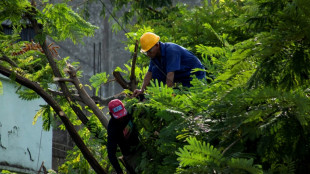
-
 In New York, a night at the museum -- five years in the making
In New York, a night at the museum -- five years in the making
-
Trump makes Qatar stop en route to Asia summits, Xi talks

-
 England women lose to Brazil on Euros homecoming
England women lose to Brazil on Euros homecoming
-
Ouattara set for fourth term after Ivory Coast presidential vote
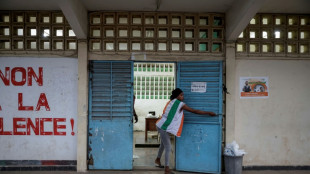
-
 Norris tops Mexico final practice ahead of Hamilton
Norris tops Mexico final practice ahead of Hamilton
-
Tens of thousands protest on anniversay of deadly Spain flood

-
 Napoli go top with slump-ending win over Inter but lose De Bruyne
Napoli go top with slump-ending win over Inter but lose De Bruyne
-
Man Utd beat Brighton, Sunderland stun Chelsea to go second in Premier League

-
 Cunha scores first Man Utd goal in win over Brighton
Cunha scores first Man Utd goal in win over Brighton
-
Trump makes MidEast pit stop en route to Asia summits, Xi talks

-
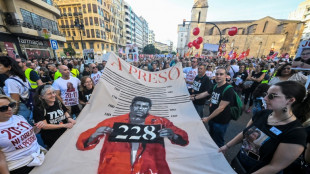 Thousands protest on 1st anniversay of Spain's deadly floods
Thousands protest on 1st anniversay of Spain's deadly floods
-
Fonseca to face Davidovich Fokina in Basel final

-
 Bayern beat 10-man 'Gladbach to match European record
Bayern beat 10-man 'Gladbach to match European record
-
PSG return to Ligue 1 winning ways

-
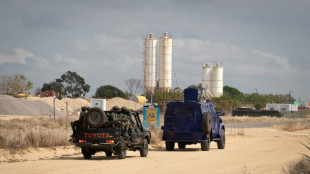 TotalEnergies approves restart of $20-bn Mozambique gas project
TotalEnergies approves restart of $20-bn Mozambique gas project
-
Wilders gets hero's welcome in Dutch heartland

-
 Sunderland stun Chelsea to go second, Newcastle beat Fulham
Sunderland stun Chelsea to go second, Newcastle beat Fulham
-
Afghanistan, Pakistan seek to firm up truce in Istanbul talks
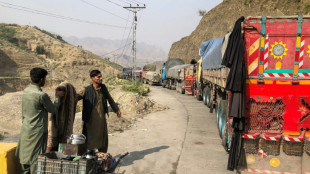
-
 Bayern move past 10-man Gladbach to stay five clear
Bayern move past 10-man Gladbach to stay five clear
-
The armed groups clashing with Hamas in Gaza


Courtrooms: a growing arena in the climate fight
The battle against climate change is increasingly being fought in the courtroom, as national governments, specific laws and individual companies are targeted for their roles in the crisis.
The cases have sometimes resulted in successfully influencing policy -- an outcome hoped for by the six Portuguese youths who have lodged a case against 32 countries at the European Court of Human Rights (ECHR), accusing the governments of moving too slowly.
Here is some key background and analyst commentary on climate lawsuits around the world:
- An explosion of lawsuits -
The number of court cases linked to climate change doubled between 2017 and 2022, according to the UN Environment Programme and Columbia University's Sabin Center for Climate Change Law.
There were more than 2,500 cases lodged worldwide as of mid-September, a Sabin Center tracker showed, with more than 1,600 in the United States.
Of the cases worldwide, 135 were brought in developing countries, including Small Island Developing States -- far-flung nations whose land is some of the most at-risk from climate change.
"Why is climate litigation still growing? Because the climate crisis is increasing in its intensity, its immediacy," Michael Burger, executive director of the Sabin Center, told AFP.
"And because government and corporate action is inadequate to meet the moment."
The number of cases being filed appears to have slowed over the past year, though it's still too early to tell for sure, according to the latest report from the Grantham Research Institute on Climate Change in London.
- Effectiveness -
Climate change litigation has affected the "outcome and ambition of climate governance," experts from the UN's Intergovernmental Panel on Climate Change (IPCC) wrote in a report last year, adding that successful cases also serve as a form of external pressure on governments.
Urgenda, an environmental organization in the Netherlands, notched a notable win at the Dutch Supreme Court in 2019, with justices ordering the government to reduce its greenhouse gas emissions by 25 percent by the end of the following year.
Government policies "that are explicitly linked to the case" were subsequently introduced, said Catherine Higham, a Grantham Research Institute policy fellow.
- Litigation 'cuts both ways' -
But a number of high-profile cases have been unsuccessful, and those seeking a greener future aren't the only ones filing lawsuits: high-emitting companies are starting to file suit against climate-friendly laws they don't like.
"Litigation cuts both ways," says Higham.
"Those that benefit from the status quo will do what they can to preserve their benefits, and that will include going to court," added Burger.
Additionally, activists can find themselves in the crosshairs of suits linked to disruptive protests, though "judges have generally taken the climate crisis" as well as the role of civil disobedience "into consideration in sentencing," according to a report from the UN Environment Programme.
- Companies targeted -
In addition to governments, companies themselves can also be the target of lawsuits, with litigants pressing for both compensation and a change in corporate behavior.
In another historic Dutch decision, Shell was ordered in 2021 to reduce its CO2 emissions by 45 percent by 2023 -- a decision the oil major is appealing.
A new strategy employed by climate change activists is to target "greenwashing," accusing companies or organizations of deceptive practices concealing their true environmental footprint.
FIFA is among those that have been accused of the practice.
- Stronger data -
Scientists are increasingly able to establish the links between climate change and individual extreme weather events, as well as the role of specific high-emitting industries, from oil extraction to mining to cement production, in climate change -- data that is often used in lawsuits.
A county in the northwestern US state of Oregon filed suit in June against multiple international oil majors, seeking $51 billion in damages after a deadly "heat dome" blanketed the northwest of the country in 2021.
- Human rights -
Human rights also take center stage in some cases, often concerning people's rights to health and well-being or to a clean environment.
These sorts of arguments are often made in cases before international tribunals, like the ECHR.
- Non-binding, but influential -
Even when decisions are non-binding, they can influence government attitudes and policies worldwide.
Activists are currently awaiting advisory opinions from the International Court of Justice and the International Tribunal for the Law of the Sea on the obligations of individual states in climate matters.
"Although such opinions are non-binding, they have great potential to shape the future development of climate change law," according to the Grantham Research Institute.
A.Malone--AMWN



